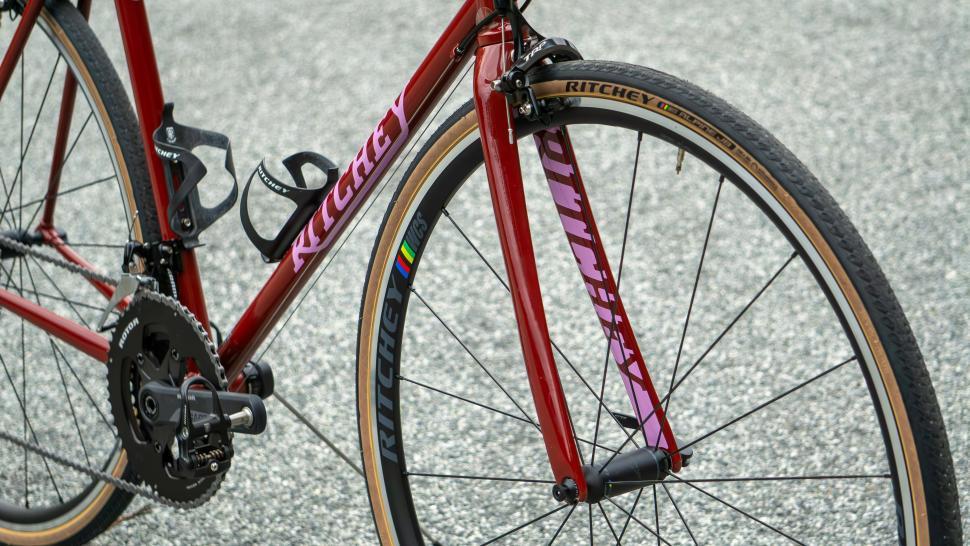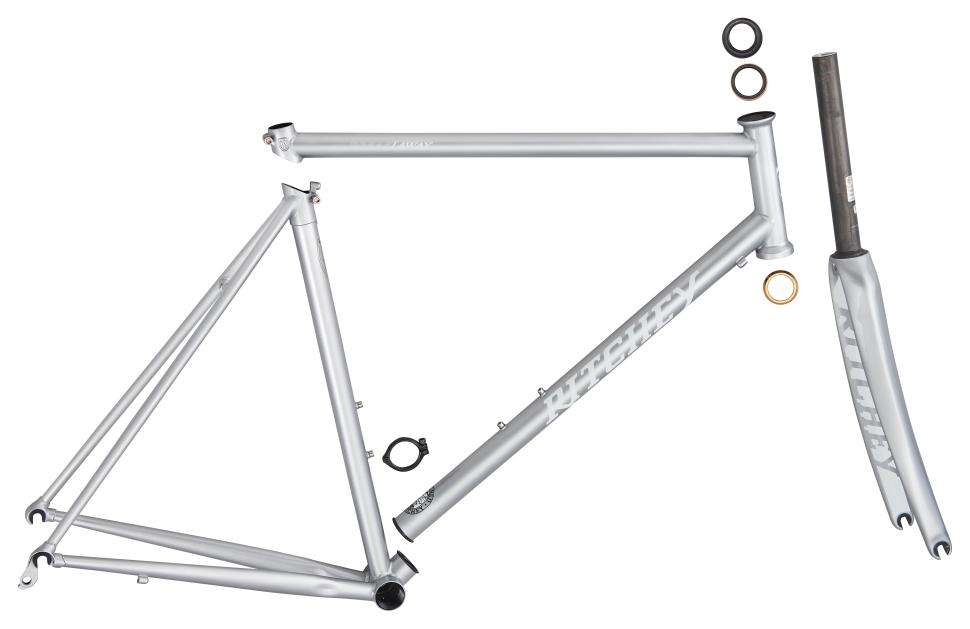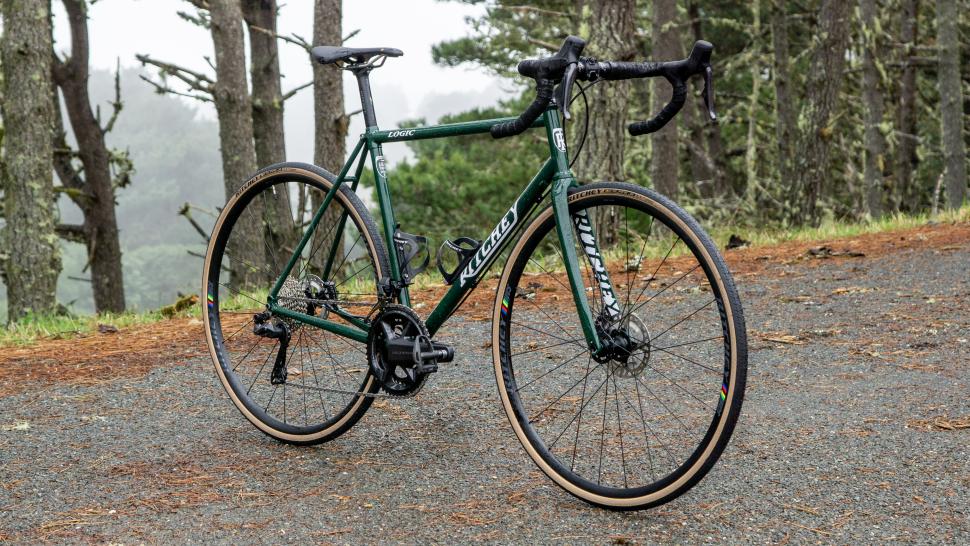- News
- Reviews
- Bikes
- Accessories
- Accessories - misc
- Computer mounts
- Bags
- Bar ends
- Bike bags & cases
- Bottle cages
- Bottles
- Cameras
- Car racks
- Child seats
- Computers
- Glasses
- GPS units
- Helmets
- Lights - front
- Lights - rear
- Lights - sets
- Locks
- Mirrors
- Mudguards
- Racks
- Pumps & CO2 inflators
- Puncture kits
- Reflectives
- Smart watches
- Stands and racks
- Trailers
- Clothing
- Components
- Bar tape & grips
- Bottom brackets
- Brake & gear cables
- Brake & STI levers
- Brake pads & spares
- Brakes
- Cassettes & freewheels
- Chains
- Chainsets & chainrings
- Derailleurs - front
- Derailleurs - rear
- Forks
- Gear levers & shifters
- Groupsets
- Handlebars & extensions
- Headsets
- Hubs
- Inner tubes
- Pedals
- Quick releases & skewers
- Saddles
- Seatposts
- Stems
- Wheels
- Tyres
- Health, fitness and nutrition
- Tools and workshop
- Miscellaneous
- Cross country mountain bikes
- Tubeless valves
- Buyers Guides
- Features
- Forum
- Recommends
- Podcast
feature
 bike at bedtime ritchey road logic
bike at bedtime ritchey road logicIs this the return of the rim brake!? Ritchey's Road Logic makes a comeback in three configurations
Just when most of us had already buried our hopes of a brand new, shiny rim-brake road bike deep in the ground, Ritchey has made a rather triumphant return with its iconic Road Logic framesets, two of which stop via the simply squeezing of two pads against the wheel rim. Although there is a disc brake version of this iconic road bike available too, it's nice to see that the American brand still has belief in tradition and... well, not-so-good stopping power if we're being completely honest.
It's been a while since we've mentioned the Road Logic here on road.cc, too - it was back in 2012 when we first talked about the classic bike and in 2018, there was an updated model in a Skyline Blue paint job and increased tyre clearance for 30mm tyres, allowed by the new carbon fork. In 2019, the first Road Logic with disc brakes entered the stage.
Now, the reintroduction includes three versions: the classic Road Logic, a travel-friendly Road Logic Break-Away — both with rim brakes — and the Road Logic Disc. Why bring these bikes back, especially with rim brakes? Well, Ritchey says that the demand has simply grown high enough to justify a comeback.
"People are fanatical about the Road Logic, constantly asking us when it will be back. We’re happy to again bring this absolutely gorgeous frame, in all three versions, to Ritchey’s loyal fans and customers," Jeff Lockwood, Ritchey's International marketing manager, said.
The bike has actually not changed much at all since the 2012 model. Back then, the bike came in six sizes from 49cm to 59cm and featured classic Ritchey geometry, which is the same as the new ones. The 55cm version, for example, comes with a 525mm seat tube, 563mm effective top tube, 16cm head tube and 73.5° head and seat tube angles.
It seems as Lockwood said, the brand is indeed bringing back what people already know, but also something slightly different. The Break-Away and Disc models have slightly different size ranges and features.
The classic Road Logic model continues to be crafted from heat-treated and triple-butted Ritchey Logic tubesets, featuring aggressively short-butted sections optimised for TIG welding (which results in stronger welds) that save weight and improve ride quality.
The 55cm Road Logic frame weighs 1.77 kilograms, which wasn't ever really lightweight and still isn't today. Then again, this is more of an endurance bike than a lightweight hill climber, as Ritchey himself says: "The Road Logic is ideally suited for long, epic days in the saddle on roads that are not always paved, and still nimble and stiff enough to take the county line sprint at the end of the day."
The newest Road Logic is finished in a 'Sally’s Macarons paint scheme', which is deep red with pale purple branding, and it's priced at £1,407.90.
The new addition to the Road Logic range is the Break-Away frameset, a unique design that is also offered on Ritchey's Outback adventure bike frameset (there was also a Ritchey Carbon Break-Away that we reviewed in 2017, but it's been discontinued).
In essence, the bike breaks into two parts which should make travelling that little bit easier, as it folds away easily (according to Ritchey) in its sturdy travel case that is designed to help you avoid airline extra baggage fees. The Break-Away has external cable routing and the same steel construction as the classic model and retails for £2,024.
Last but not least, we have the Road Logic Disc frameset, which is much like the classic bike but with modern disc brakes. It now features compatibility with Shimano's latest Di2 semi-wireless groupsets, but also retains cable stops for mechanical groupsets. You also get a one-piece truss chainstay for flat-mount disc brakes, reducing chainstay weight – though the full 55cm frame will still tip scales at 1.94kg. The price for this frame is £1,583.90.
What do you think of the resurrection of the Road Logic? Let us know if you want one in the comments, and also check out our other Bike at Bedtime features...
Latest Comments
- NickSprink 1 hour 45 min ago
The frame is metal, so doesnt need the cables from the battery to the motor, just pass the current through the chainstay
- stonojnr 1 hour 46 min ago
Could make a crass joke about how youre only supposed to flip pancakes today, but i wont...
- Secret_squirrel 2 hours 2 min ago
So who's funding this judicial review? Follow the money road.cc.....
- qwerty360 2 hours 13 min ago
I can accept this under one condition:...
- Mr Anderson 2 hours 21 min ago
I wouldn't worry too much about the locks being picked, in nearly all cases of bike theft, those Ninja moped gangs, the only things they can pick...
- brooksby 2 hours 39 min ago
They want to pick on The Others in general, rather than a specific group. Immigrants can hate Others just as much as Nigel Farage does.
- don simon fbpe 2 hours 43 min ago
There's no doubting how bad the sport must have been when a banker feels moral enough to criticise...!
- mdavidford 2 hours 45 min ago
I don't think they've come in from that end at all - all three approaches are bollarded, and I don't think there's room to get through. I think...
- chrisonabike 3 hours 17 min ago
More clearance damnit!!!



Add new comment
35 comments
Excellent review. Setting aside the cost, the Break Away frame looks really good, and something I am interested in. It looks less of a faff than S&S Coupling (I haven't any experience of either) but those S&S look really strong. The excellent video on the Ritchey website (never looked at the site before) is fronted by just the right sort of American, but it shows the antique brake version- anybody with experience of packing the proper brake version? (it appears it works with cable and hydraulic)
I've a Goff steel custom, and a BXT carbon frame both rim brakes, come on - ja reckon Coppi, Merckx would gone faster on discs, they tried not to stop...
Except for wet off road conditions I'm unable to see the shortcomings of rim brakes, provided your careful about the brake blocks you have fitted (the cheap bucket shop ones are dangerous). I can stop pretty quickly wet or dry and have occasionally been hit up the rear by cars (with disc brakes), on the other hand you may prefer to follow the trend and pay for it.
Rim wear is the obvious other one, although - as with other things - whether it's a significant issue depends on your particular circumstances.
Good luck to Ritchey, there may well be sufficient niche for this bike now that almost noboby else makes similar.
Not the return of the rim brake, just allowing customers to choose the braking system they prefer. I have both and I find the attention seeking behaviour of disc brakes tiresome.
My front disc does admittedly squeal when wet, but my front canti would also squeal when out of adjustment with wear...
I've been round the houses with squealing disc brakes and am back on cantilevers for CX duties, mini-Vs for gravel duties and callipers for road duties.
I don't doubt that I could have persevered with discs and got them to operate silently in wet cold conditions (I had no problem getting them to operate silently in dry conditions) but as Ernie says, I just got tired of trying. Cantis can still be fickle but it's never anything that a bit of toe-in and/or better pads can't solve.
For what it's worth, the discs on my MTB were similarly noisy in the wet until I put in some long and exceptionally hilly rides where I properly cooked the brakes death-gripping them down long rocky descents where I was clearly out of my depth. They're now silent in all conditions, even horrible slushy snow-melt rides. I just don't think I ever got my road/gravel disc brakes hot enough often enough.
Someone suggested (think it was a Canyon team mechcanic) that a disc brake is never truly bedded in until after 300km of hard riding (e.g. MTBing). The pads might be but the surface of the disc isn't properly burnished which is where the squeal comes from. No idea what the equivalent km in light feathering on a road bike is!
I too have both but only the discs turn me into an irresistible sex machine.
that must be why your discs squeal so much ...
an unstoppable sex machine?
See below
I don't think any of it seriously meant: cycling/ cycling discussion would be less fun if there wasn't Campag vs Shimano vs SRAM, rim vs disc, downtube vs brifter, tubeless vs tubed or if e-bikers and triathletes were cyclists.
If people want to pay significantly more for control systems that won't last, are more complex and less fixable, cost rather than save weight, then that's up to them, innit.
Breakaway frameset not available on EU/UK website, as was the case with the previous Breakaway.
Seems like a missed opportunity to design for deep drop callipers, same fuss free, relatively inexpensive performance as standard callipers but better tyre clearance. Would suit the style of bike surely.
The 2018 update (which I believe the new frame is based on) had clearance for up to 30mm. If you have 2016 era or later Shimano, or some TRP (Tektro) models, have a standard drop with clearance for at least 28mm.
See second hyperlink in first paragraph below the subtitle in bold.
Oh yeah, I missed that.
Similar to my Basso Venta, can get 28mm Conti GP5000s under current gen Shimano Ultegra Callipers. Definitely feels like a step up from 25s previously.
And still no mudguard eyes. We don't all live in Cali Tom!
As much as I love the Outback it would be nice if this frame was a little more practical too, I want something with a slightly more aggressive geo.
Go on then, I'll bite: I have disc brake, rim brake and cantilever brake bikes and all of them provide enough stopping power to put me over the handlebars if injudiciously applied, so the question doesn't really apply. Certainly there are arguments for better modulation etc but in terms of outright power I can't really say which is superior, all setups have more than enough.
What about in the wet?
Have to squeeze a bit harder maybe, but still get to the skidding point well before one runs out of power.
Not my personal experience - I have had occasions with rim brakes when I was seriously worried about stopping in time in the wet; never had that with discs. Having said that, my main reason for preferring discs is not wearing out rims!
Exactly my experience too. In fact I can still distinctly remember the rainy day on which at the bottom of short, steep dip I had to give way to a car. Pulled on the rim brakes with plenty of time and I simply didnt slow down for what seemed like seconds. Very experienced rider and it caught me out - I thought I was going to collide with the car. At that point rim brakes for me were no longer an option.
How experienced can you be if you don't know how to brake with rim brakes?
I've ridden on rim brakes for years, including back when they were just single pivots. Never had that problem.
As for the rims wearing out. I always just had a cheap set of rims on my winter wheels and saved my best wheels to race on. This obsession with using the best gear all year round is just silly.
I have never accidentally locked up the front wheel, and definitely never skidded it. I have noticed a significant increase in stopping distance when going downhill in the wet with rim brakes (10-15%) in the wet, to the point of being scary
Always think this 'over the handlebars' quote rather quite ridiculous......You're another one. Idiotic.
Discs are better all round; power, modulation, etc
I can happily live with a good V-brake setup, but only to reduce cost. Having both discless and expensive bike seems a two way fail to me.
To be honest V-brakes are the one type I would not touch with a barge pole. It is possible that this is coloured by the fact that I have only had them on second hand kids bikes, but I always found them to be a bit $h!t.
V brakes on mountain were a big step forward compared to the cantilever brakes of the time, now all mountain bikes use disc brakes, but there was no better rim brake as they phased out.
My experience was kind of reverse with calipers, as I had a couple of very frightening experiences with old caliper brakes, but even with a modern set, I was dissapointed. With V-brakes I have got down steep mountains with confidence.
Pages